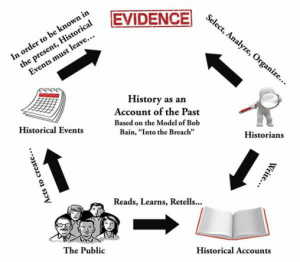Hello Team,
I hope you are all doing well and catching up in the course material. I too am trying to catch up, and am happy to say that I am now posting my three definitions assignment. I have chosen to do my assignment on the term “historiography”. This term is in association with my major, history, and one that I would like to share with my team. Please contact me with any questions or concerns, and I look forward to reading your feedback.
Sincerely,
Taylor Smith
Term: Historiography
Introduction:
Assignment 1:3 focuses on definitions, and we are to choose one technical term to research and define that is in association with our discipline or professional field. The purpose is to teach us how expand on a technical term through a detailed and well-organized definition, which caters to the non-technical reader. As a history major, I have chosen to define the word “historiography”, which is concerned with how historians approach the study of history. Within this assignment I will be providing a parenthetical, sentence, and expanded definition to help the non-technical reader better understand the meaning of the term “historiography”.
Parenthetical Definition:
Historiography (the study of history over time) is a method or approach historians use to study how history has been recorded throughout the past.
Sentence Definition:
Historiography is the multiple methods or approaches historians use in order to study the recordings of past events, key figures, and time periods.
Expanded Definition
History:
Although the initial first use of the term “historiography” is unknown, the concept behind it has been around since the first recordings of history. Ever since humans started to record history, whether through ancient carvings, manuscripts, or literature, all cultures throughout the past have read and interpreted past events, people, and periods in new ways, as with the changes of time so too changes the ways in which people view the world (Vann: page 1 of 3). It can be argued that because of new ways of thinking historians of the 21st century are able to take what has already been recorded and studied and apply new ways to understand history more accurately than those who studied before them (Vann: page 1 of 3).
As historians reinterpret the past through the study of primary documents, or literature that describe it, new re-telling’s of a past time are told to the modern era. Professor Bob Bain created the following model in order to visually explain the way in which history is taken in, interpreted/reinterpreted, and presented in the present time period.

Figure 1: A model constructed by History Professor from the University of Michigan, Bob Bain, shows the relationship between past events, the evidence that supports these events, and the way historians interpret and record the historical accounts.
[Digital Image of Bob Bain’s Model]: Retrieved January 28, 2019, from http://www.21socialstudies.com/blog/historiography
Compare and Contrast:
A common misunderstanding of the term “historiography” is that it is associated with the term of “history”, or the study of the past. Indeed both are associated history, however, the difference between them is quite significant. The term “history” is referring to “the study of past events, particularly in human affairs” (Oxford Dictionary). On the other hand, the term “historiography” refers to the study of how history written and recorded and how the ways in which we understand history changes over time (Llewellyn and Thompson 1 of 1). While they both deal with history in a general sense, the term historiography differs from the term history, as the former focuses more on who is telling something and how it is being told, rather than focussing on what is being told.
Negation:
Similar to Compare and Contrast we can better understand the term “historiography” by clarifying what it is not. Historiography is not the actual study of past events, key figures, or time periods. The term is meant to describe the way in which history is recorded and how the viewpoints of the historian at the time can influence the way in which he/she records their findings.
Required Conditions:
For a historiography to work it needs people engaged in the recording and studying of history. As stated previously, historiography is the study of the collective interpretations of a particular event, person, or time period over a certain amount of time. Because viewpoints and morals sometimes change over time, the way in which we view the past can be influenced by these particular characteristics, resulting in different interpretations of the past. Michael Bentley. Author of Modern Historiography: An Introduction, uses the Enlightenment as an example to show how the way we view history can change over time. He writes that certain works of history have a different tone and understanding of the past, which can be seen in the works created before and after the social and scientific advances that came to be during the era of the Enlightenment (Bentley 1). In a time period of such dramatic change, it can be expected for the ways in which people viewed the past changed dramatically. In an ever-changing world historians will look to the past and understand it differently by building on what has already been covered, or unpacking new ideas that either supports or goes against the previous claim.
Works Cited
Bentley, Michael, and Taylor & Francis eBooks A-Z. Modern Historiography: An Introduction. Routledge, New York;Florence;, 2015.
- Llewellyn and S. Thompson, “What is historiography?” at Alpha History, https://alphahistory.com/what-is-historiography/, 2014.
Oxford Dictionary, “History” in English Oxford Living Dictionaries. Published by Oxford. https://en.oxforddictionaries.com/definition/history.
Vann, T. Richard. “Historiography” in Encyclopaedia Britannica. Encyclopaedia Britannica, Inc. (2018). https://www.britannica.com/topic/historiography
Historiography: https://en.wikipedia.org/wiki/Historiography
Leave a Reply